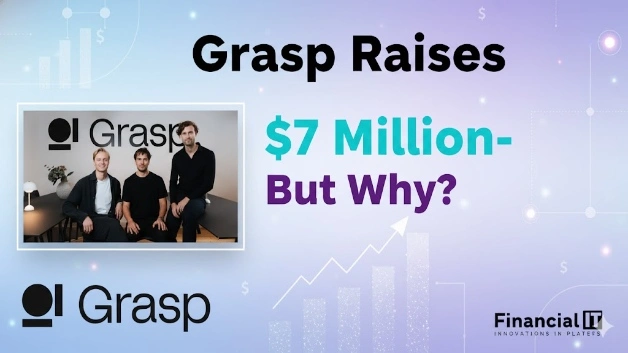The global fintech sector witnessed a pivotal moment as Grasp, the Stockholm-based startup developing multi-agent AI systems for investment banking and management consulting, secured $7 million in Series A funding, bringing total capital to $9 million. Led by UK-based Octopus Ventures with participation from existing investor Yanno Capital, this capital infusion coincides with the company opening its first international office in London—raising a crucial question: why is venture capital flowing into finance workflow automation when investment banks spent over 90% of analyst time on manual work for decades, and AI initially struggled to handle the multimodal complexity of financial analysis?
The $1.4 Trillion Market Nobody Expected Sweden Could Disrupt
The answer lies in understanding what’s happening beneath the surface of finance automation evolution. Despite the global investment banking and management consulting services market representing $1.4 trillion in annual spending, the sector faces a critical productivity paradox. Traditional workflows require analysts to manually read reports, build Excel models, and create presentations—consuming 90%+ of working hours—yet firms demand faster turnarounds, higher accuracy, and scalability without proportional headcount increases as competition intensifies.
Grasp operates a technology platform unique in enterprise AI: proprietary multi-agent systems that replicate complex finance tasks by connecting domain-specific AI agents to trusted datasets and productivity tools. Founded in 2020 by Richard Karlsson and Johan Devér—former McKinsey consultants who experienced the manual work burden firsthand—together with Simon Hällqvist, a former Ericsson AI engineer bringing critical technical expertise, the 25-person team transforms finance workflows through automation that handles competitive analyses and market mappings in minutes versus the week previously required.
Why Finance’s Productivity Crisis Required Multi-Agent Solutions
Grasp’s rapid customer expansion provides context for why automation capabilities outweigh incremental improvements. When global consulting firms and investment banks compete on delivery speed and analytical depth simultaneously, manual processes create bottlenecks traditional software cannot solve. Finance workflows demand understanding unstructured data across presentations, PDFs, financial statements, and market reports—then synthesizing insights into actionable deliverables formatted for client consumption. Single-task AI tools automate isolated steps, but multi-agent systems coordinate specialized capabilities mimicking how analyst teams collaborate.
The funding structure of Grasp reflects institutional recognition that finance automation superiority determines 21st-century advisory advantage. Octopus Ventures Principal Rich Bolton articulated market dynamics: “Grasp is at the forefront of vertical AI in finance, having built a multi-agent system that delivers the kind of high-quality output finance professionals rely on. Their strong traction—more than tripling annually and winning major global customers—demonstrates both the power of their technology and the urgency of the need.”
The Multi-Agent Architecture Behind Enterprise Adoption
The funding round accelerates product development and sales team expansion while supporting international growth through the London office launch. The timing coincides with enterprise AI reaching inflection points where multi-agent capabilities mature sufficiently to handle finance’s multimodal demands. The AI consulting services market projects growth from $11.07 billion in 2025 to $90.99 billion by 2035 at 26.2% compound annual growth rate, with finance and banking holding 22.3% market share. A Harvard study found management consultants incorporating AI tools completed tasks 25.1% faster, finished 12.2% more tasks total, and delivered 40%+ higher quality versus control groups—yet single-agent systems lack coordination for end-to-end workflow automation.
Grasp differentiates through architectural breakthroughs enabling agent collaboration at enterprise scale. Unlike general-purpose AI assistants requiring extensive human guidance, multi-agent systems assign specialized roles—data collection agents gather financial information, analysis agents identify patterns and generate insights, presentation agents format outputs—coordinating through orchestration layers mimicking human team dynamics. Karlsson noted: “At McKinsey, we spent over 90% of our time on manual work. Together with Simon, who brought critical AI expertise from Ericsson, we realized AI had the potential to completely transform this $1.4 trillion market.” This architectural decision positions the company uniquely: productivity becomes competitive differentiation rather than cost center.
Why This Matters For Global Finance Technology
Grasp’s $7 million raise positions the company within broader 2025 enterprise dynamics where multi-agent AI demonstrates strategic advantages justifying massive investments:
Automation Threshold Breakthroughs: Financial institutions report 38% profitability increases by 2035 through AI agent deployment, with 53% of finance executives confirming organizations actively use AI agents in production—40% launching more than ten agents. Intelligence, surveillance, and research tasks automated through multi-agent coordination compress deliverable timelines from weeks to minutes, fundamentally altering competitive dynamics. Recent studies across business settings reveal time savings of 65-86% versus human-only workflows, with enterprise logistics cases reducing planning from five hours to 35 minutes using multi-agent systems with goal inference and memory-based task continuation.
Market Maturation Accelerating: The AI agents market valued at $7.38 billion in 2025 projects growth to $103.6 billion by 2032 at 45.3% compound annual growth rate. Financial services specifically account for 20% of global AI spending increases between 2024-2028, with 85% of organizations integrating AI agents in at least one workflow by end-2025. Companies adopting agentic AI report average revenue increases of 6-10%, while AI-driven automation yields 40% operational efficiency gains and 25% hiring cost reductions.
Conclusion
So why $7 million for Grasp? Because the company combines elements investors value: deep domain expertise from founders who experienced finance’s manual work burden firsthand, proprietary multi-agent architecture delivering enterprise-grade automation quality, and strategic timing where AI agent capabilities mature while consulting firm productivity demands surge. Financial services invested approximately $35 billion in AI in 2023—with banking accounting for $21 billion—seeking returns through innovative strategies and operational efficiency as competitive pressures intensify.
The investment validates that finance automation winners emerge through multi-agent coordination breakthroughs enabling end-to-end workflow automation rather than incrementally improving single-task tools. With AI consulting services reaching $90.99 billion by 2035 and finance holding dominant 22.3% market share, Grasp captures value at disciplinary intersections where enterprise software, domain expertise, and agentic AI converge—analogous to how Salesforce transformed CRM through cloud-native architecture rather than replicating on-premise systems.
I’m Araib Khan, an author at Startups Union, where I share insights on entrepreneurship, innovation, and business growth. This role helps me enhance my credibility, connect with professionals, and contribute to impactful ideas within the global startup ecosystem.
